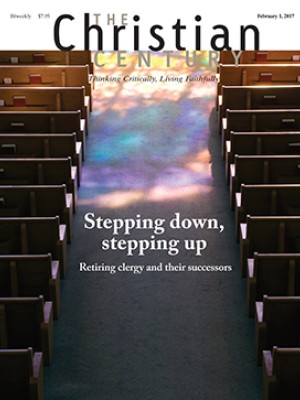By number, Christians overrepresented in Congress
(The Christian Science Monitor) Even as the percentage of Americans who claim no religious identification has risen to nearly a quarter of the population, 91 percent of representatives in the current Congress call themselves Christian—about the same amount as in 1961—according to an annual analysis from the Pew Research Center.
That doesn’t mean the religious composition of Congress hasn’t changed at all: the share of Catholics has climbed substantially, from 19 percent in 1961 to 31 percent today, while the share of Protestants has fallen from 75 percent to 56 percent over the decades. And while the share of Jews has remained roughly the same since the early 1980s, more Buddhist, Mormon, and Muslim politicians have been elected to Congress, in proportions that more or less reflect those of the general public.
Read our latest issue or browse back issues.
“The group that is most notably underrepresented is the religiously unaffiliated,” according to Pew, whose study uses data compiled by CQ Roll Call. Only one member of Congress, Rep. Kyrsten Sinema (D., Ariz.), lists no public religious affiliation.
That gap may illuminate the enduring importance of religious institutions in American public life, despite a decrease in the number of people who actively identify as members. Among Christians alone, the percentage of the population dropped from 78.4 to 70.6 between 2007 and 2014.
Part of the reason has to do with the social characteristics associated with success in politics, said John Green, a political scientist at the University of Akron. “Members of Congress tend to be well-educated people, from professional backgrounds—particularly lawyers—well into their professional careers, so they’re middle-aged, and active and engaged in the community. Religious organizations are really important parts of most communities in the United States.”
The connectedness afforded by religious denominations often contrasts with the habits of the nones, who tend to be less engaged in community life, he said.
“They also tend to be younger and well-educated, though, so it could be that over time, as younger unaffiliated people come into middle age and get well established into their professions, you could see greater representation in Congress,” he said.
Such networking also happens on Capitol Hill, including at weekly prayer breakfasts, one of the few venues on the Hill where members of both parties mix socially. Typically about a quarter of the Senate shows up, including members of the leadership of both parties, according to Sen. Chris Coons (D., Del.). Participants drop politics at the door. They observe strict confidentiality. No staff. No journalists. It’s just the senators and the chamber’s chaplain, who leads the singing.
The confidentiality of the Senate prayer breakfast and its companion in the House—which are separate from the National Prayer Breakfast—allows lawmakers to hear about each other’s struggles and joys, about concern for family members, friends, and staff. One participant said that it’s the only time when a senator is speaking and others are really listening. That builds trust and can even lead to bipartisan legislation.
Many voters whom studies label as “nones” may still see a candidate’s faith in a positive light, since many are not actively opposed to organized religion, said David Campbell, a political scientist at Notre Dame University who has written several books on religion in U.S. politics.
“We also know from other data that while religious voters might be wary of a nonreligious candidate, it doesn’t go the other way: nonreligious voters are still open to voting for politicians who do have a religious affiliation,” Campbell said.
Some might still see the morality of a politician as being tied to his or her religion, he said. Others might be just fine with fewer separations between church and state and vote for lawmakers who are, too.
Surveys periodically turn up fluctuating enthusiasm for more religion in politics. In 2014, for instance, 41 percent of respondents told Pew that there was “too little” religious expression from political leaders, marking a modest rise during Obama’s term in office.
“It may not be their thing, but a lot of ‘nones’ see [religion] as a source of moral values, as a way of bringing people together,” Green said. “Even if they may not be religious in a formal sense, they may still have positive views associated with it.”






